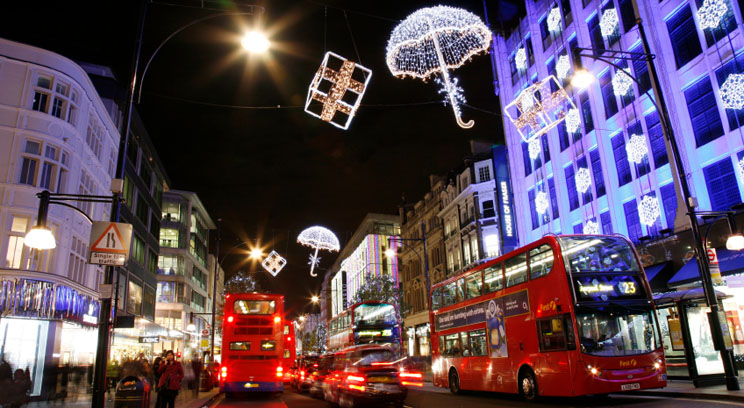With Thanksgiving behind us, thoughts now turn to … holiday shopping.
I’ve been teaching in the London Business Semester, so I will miss working on the annual holiday spending survey we’ve conducted in the Twin Cities since 2002. But as you know, holiday traditions are ever present in our world.
Being based in London during the holiday season got me thinking about similarities – and differences – in our cultural and retail traditions.
While both London and the Twin Cities celebrate the birth of Christ, London in particular has a significant non-Christian population that doesn’t celebrate Christmas. The capitol city of Britain is, however, steeped in Christmas traditions. London is the home of George Fredric Handel, who composed “The Messiah” in 1741. And Charles Dickens published the timeless classic “A Christmas Carol” here in 1843. Both cities host annual stage productions of Dickens' story, including the Guthrie Theater in Minneapolis, which will perform “A Christmas Carol” for the 38th consecutive year.
While outdoor Christmas decorations may be ubiquitous in Twin Cities’ neighborhoods, these very visible displays are generally limited to retailers and commercial areas in London. Christmas lights were illuminated on Oxford and Regents streets in central London on Nov. 5 this year, while lights on Nicollet Mall are still a few weeks off. Store windows are fully decorated by Nov. 1, but the Twin Cities has fewer displays that won’t be shown in full for several weeks. Citizens of both cities do, however, decorate the interior of their homes with Christmas trees, nativity scenes and holiday accents to celebrate the season.
How about the annual Christmas party? In London, pubs and restaurants begin soliciting Christmas party business in early September, while few in the Twin Cities begin planning these festive events until November (or later!). These parties are much more important in London and often focus on office, family and friends, while there are fewer and more work-focused parties in the Twin Cities. The attire for these holiday gatherings tends to be more formal in London than in the Twin Cities.
It would not be Christmas without a feast. Londoners typically celebrate Christmas dinner midday or early afternoon, whereas Twin Citians may celebrate Christmas Eve or midday on Christmas. The dinners are strikingly similar: Both are likely to feature a roast turkey – or possibly a goose in the case of Londoners – and roast beef or pork in the case of Twin Citians. Londoners enjoy sides of brussel sprouts, roast potatoes, cranberry sauce, nutty stuffing, pigs in a blanket, and pudding for dessert, while Twin Citians’ tastes include squash, root crop vegetables, mashed potatoes, gravy, cranberry sauce and pies for dessert.
In both metropolises, Christmas is spent in church on the eve or morning followed by dinner and family time. Londoners are likely to watch sports on the telly or play board games as a family, while Twin Citians often watch football on TV or go to movies together. Londoners continue the holidays by celebrating Boxing Day the day after Christmas, a holiday rooted in the tradition of giving to those less fortunate. Unfortunately, Boxing Day has progressively migrated away from this emphasis and toward going to Boxing Day sales (which have now expanded to Boxing Week). There is no equivalent post-Christmas holiday for the Twin Cities, but we share the sales-and-returns week between Christmas and New Year’s.
It’s no surprise that Christmas and holiday shopping is important to both cities. It creeps in earlier and more gradually in London starting with Super Thursday (Oct. 11 this year), which kicks off the season by introducing more than 100 hardback books targeted for Christmas sales. The Twin Cities traditionally kicks off the Christmas selling season on Black Friday (Nov. 23 this year), but many retail outlets are opening at 9 p.m. on Thanksgiving Day. Both cities have experienced “Christmas Creep,” where retailers begin selling Christmas goods earlier and earlier each year. Online shopping has only accelerated this phenomenon.
One major retail difference between these cities is the presence and importance of Christmas Markets in London and indeed throughout Europe. These markets are centrally located near high streets or major shopping areas and provide special Christmas offerings. They often combine sales of products with dining, beverages and entertainment. The Twin Cities has no equivalent. Christmas boutiques sell crafts and related Christmas items, but are single, widely located places.
Not surprisingly, both London and the Twin Cities celebrate Christmas in similar ways with faith, family, food and gifts. And increasingly, our shopping traditions are becoming more and more similar. Only time will tell if this convergence is a product of our transient nature or a melding of world cultures and traditions.
Editor's note: Dave Brennan is a professor of marketing and co-director of the Institute for Retailing Excellence in the Opus College of Business. He conducts an annual holiday spending survey with his colleague Lorman Lundsten.







